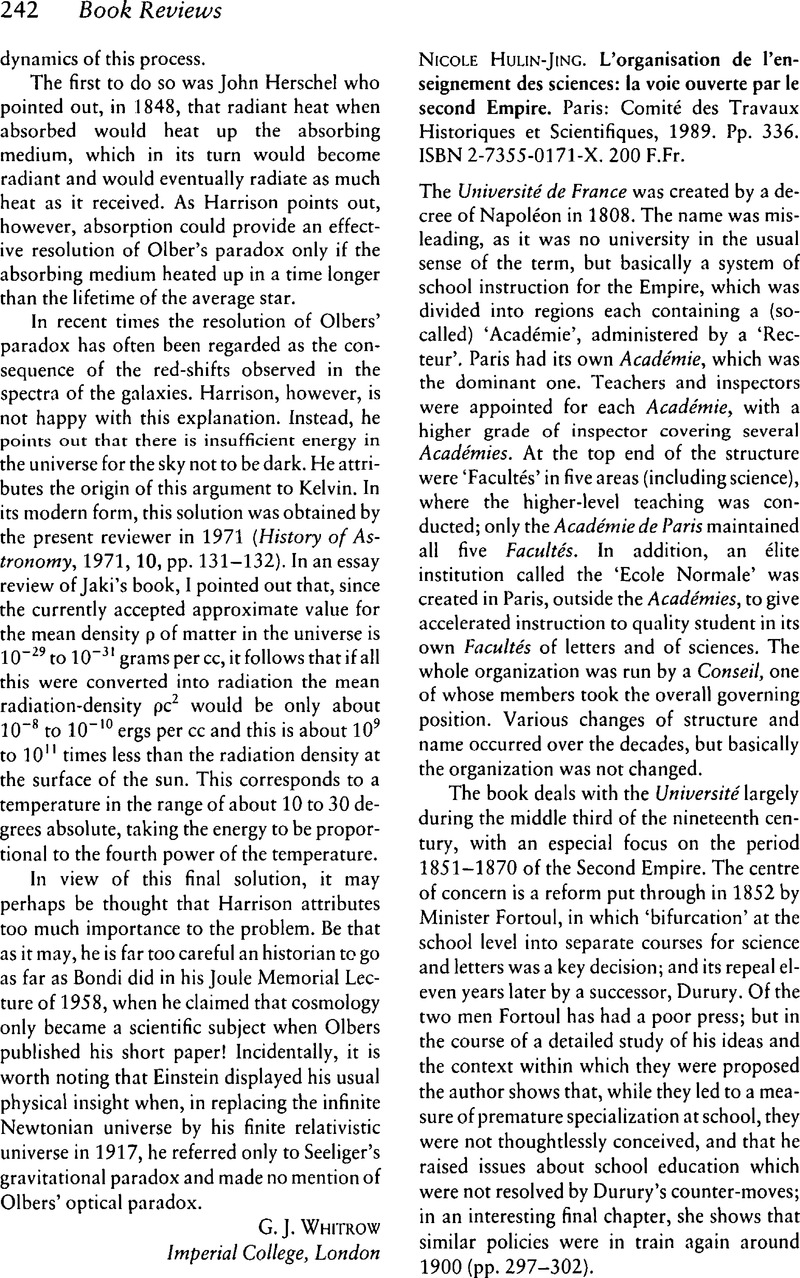No CrossRef data available.
Published online by Cambridge University Press: 05 January 2009

1 It is worth noting also the chaotic Nachlass of Poinsot, inspector in the Université and later a member of the Conseil (Bibliothèque de l'Institut, mss. 948–965, especially mss. 959, 960, 962, 965).
2 An influential text was Gratry, A.J.A, Philosophie Logique, 2 vols, 1st edn, Paris, 1855Google Scholar; eds to 5th (1868). This highly theological and mathematical text influenced some logicians elsewhere (for example, Boole). Rather unusually for a graduate of the Ecole Polytechnique, Gratry took holy orders, and taught in the Faculté de Théologie in Paris.
3 See Gerbod, P., Paul-François Dubois: universitaire, journaliste, et homme politique, Paris, 1967.Google Scholar From 1833 to 1848 Dubois was also the (ineffective) professor of literature at the Ecole Polytechnique.
4 Thenard's report is most easily found in Moniteur universel, (1838), pp. 138–139.Google Scholar I would stress the importance to the historian of science of this official newspaper: it regularly contained decrees, programmes and courses for all scientific institutions, and (especially during the Revolutionary period and the First Empire) some scientific articles and book reviews.
5 Poncelet's letter is in Moniteur universel, (1848), p. 868Google Scholar; it was reprinted in Tribout, H., Un grand savant. Le général Jean Victor Poncelet, 1788–1867, Paris, 1936, pp. 122–125.Google Scholar
6 For an overview of this imbalance just prior to this period, with especial reference to mathematics and the physical sciences, see my ‘Grandes écoles, petite Université: some puzzled remarks on higher education in mathematics in France, 1795–1840”, History of Universities, (1988) 7, pp. 197–225.Google Scholar
7 Leverrier's report is Rapport sur l'enseignement de l'Ecole Polytechnique, Paris, 1850Google Scholar; the first 200 pages were reprinted in Moniteur universel, (12.1.1851), supplement, xxxiv pp. See also his shorter statement in ‘Rapport supplémentaire… relative aux écoles polytechnique et militaire”, Assemblée Nationale Législative, (1850), no. 865. Ten year before him Coriolis, as the second-in-command at the Ecole Polytechnique, had drafted a somewhat similar reform. His manuscript is discussed and partly transcribed in my Convolutions in French mathematics, 1800–1840. From the calculus and mechanics to mathematical analysis and mathematical physics. 3 vols, Basel and Berlin (DDR), 1990, pp. 1346–1351.Google Scholar
8 Weiss, J.H., The making of technological man. The social origins of French engineering education, Cambridge, Mass, 1982Google Scholar purports to be a history of this school and of technical education in France in the early nineteenth century. The author welcomely criticizes this work on pp. 81 and 92; for a selection of other possible comments, see my review in Annals of Science, (1983) 40, pp. 305–306.Google Scholar